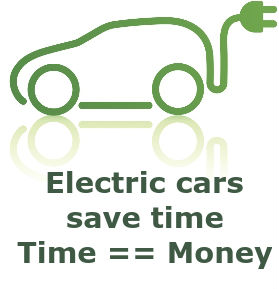Last Update: July 2, 2015

What is your time worth? How much would an extra hour or two every week be worth to you?
Some point to saved time as one of the ways electric cars save you money. The theory is that an electric car owner doesn't have to do various tasks required by gasoline car ownership, and therefore they have more time with their family, for leisure, or for working.
A few examples are:
Don't need to stop at refueling stations (as often): The vast majority of electric car owners have home charging, and therefore have the luxury of a fully charged car every day. The person who can charge at the office has the luxury of a fully charged car when they leave to return home. Gasoline car owners instead have to hunt for a gas station every few days to top up their tank, and every so often run out out of fuel and get stuck by the side of the road.
This represents a half hour or so per week, I'm guessing, for the typical person?
Driving solo in the high occupancy vehicle lane, in the states which allow it: California and some other states allows electric cars to be driven solo in the high occupancy vehicle lane. With California's heavily log-jammed highways, this saves a lot of time during commute hours. Some portion of the SF Bay Area's highways turn into parking lots in that time, and it can take an hour to travel even just 10 miles in certain areas.
What does this represent per week? An hour? Two hours total?
Don't need to spend as much time on routine maintenance like oil changes: Electric cars don't require oil changes and other routine maintenance, or not as much. That means no need for a trip to the local Jiffy Lube every four months.
This time saver is pretty small, perhaps 2 hours every four months.
Each of these represents saving a few minutes here and there throughout the week. For example, the faster commute means being able to leave home a few minutes later in the morning than otherwise, or returning home more quickly in the evening.
Add these up and these three items looks like about 80 hours per year saved. Which gets back to our question at the top - what's your time worth? At $50/hour that's $4,000 a year.
Are you for real?
I know you're asking whether I've lost my mind. And, yes, this line of reasoning is pretty weak especially as it doesn't directly put money in your pocket. That $4,000 a year savings is not real money, but some kind of virtual value.This "time saved equals money" idea was invented by Tesla Motors in their
True Cost of Ownership calculator. That gives me a chance to point my finger at someone else and deflect blame from me.
Seriously, there are two parts to consider. It's clear that an electric car saves time in the scenarios mentioned above. As long as you have home based and/or work charging, then it's largely unnecessary to stop at a refueling station. As for whether this is worth a monetary value is up to you.
When do these time savings not work?
The best laid plans of mice and men don't always work out as planned.For example, you may be in the HOV lane but find it's so clogged up by other electric car drivers that it's no different than the other lanes.
It's the charging time scenario that's most likely to not work out as planned. Not everyone can charge at home, for example, and such people are dependent on public charging stations.
Fully recharging a typical electric car on a 6 kiloWatt level 2 charging station requires 3-4 hours. But, that usually doesn't cost you 3-4 hours of your personal time. Most of the time you plug the car in, then do something else while it's charging. Sometimes you have no choice but to wait around while the car is charging, costing you personal time.


